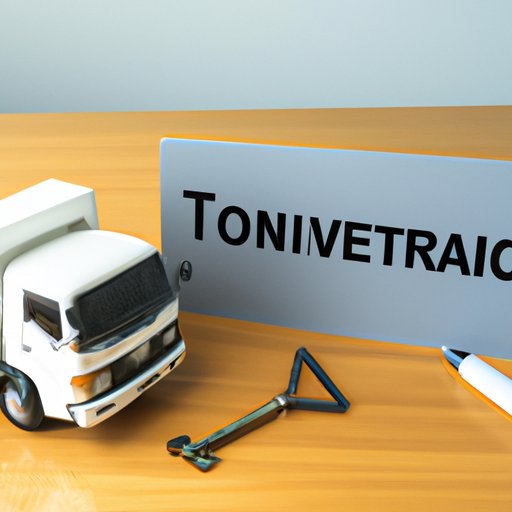Introduction
Starting a transportation business is an exciting opportunity for entrepreneurs who want to make a living while providing a service to their community. With one truck, you can start a transportation business that offers delivery services or moves goods from one place to another. However, there are many steps to consider before launching your business, from understanding local laws and regulations to purchasing the necessary equipment.
Research the Requirements for Starting a Transportation Business
Before starting any business, it’s important to understand the local laws and regulations. This includes zoning regulations, tax requirements, and any other applicable laws in your area. The Small Business Administration (SBA) recommends doing research on state and local laws and regulations, as well as any federal laws that may apply to your business. Additionally, you should consider any required permits and licenses for your business. These may include a Commercial Driver’s License (CDL), trucking permits, and hazardous materials permits, among others.
It’s also important to identify the type of insurance coverage you will need for your business. According to the Insurance Information Institute, common types of insurance for transportation businesses include general liability, commercial auto, cargo, and workers compensation. You should speak with an insurance professional to determine which types of coverage are right for your business.

Develop a Business Plan for Your Transportation Company
Once you understand the local laws and regulations, you can begin to develop a business plan for your transportation company. A business plan should outline your goals and objectives, analyze the market, and detail how you plan to finance and budget your business. The SBA recommends writing a business plan and suggests using their online tools to help you get started. Additionally, you should research the competition in your area and create a strategy for how you will differentiate your business.
Purchase the Necessary Equipment for Your Truck
The next step is to purchase the necessary equipment for your truck. You should choose a vehicle that is appropriate for the type of transportation services you plan to offer. For example, if you plan to transport large items, you may need a larger truck. You should also consider investing in additional equipment such as trailers, tie-down straps, and loading ramps, if needed.

Obtain the Necessary Licenses and Permits for Your Business
When starting a transportation business, you must obtain the necessary licenses and permits. This includes both local, state, and federal licenses. You should also consider applying for relevant permits, such as a bus permit if you plan to offer public transportation services. It’s important to understand all of the requirements for obtaining the necessary licenses and permits so that you can ensure your business is compliant.

Consider Insurance Options to Protect Your Business
Insurance is an important consideration when starting a transportation business. You should explore different types of coverage, such as general liability, cargo, and commercial auto insurance. It’s also important to estimate the cost of insurance for your business. An insurance agent can help you determine the best coverage for your needs and provide you with quotes.
Network with Potential Clients to Generate Business
The final step is to network with potential clients to generate business. This can be done by utilizing existing contacts, joining professional organizations, and leveraging social media. You should also consider attending trade shows and industry events to meet potential clients. Additionally, you can use online tools such as LinkedIn and Google Ads to reach more people.
Conclusion
Starting a transportation business with one truck is a great way to make a living. However, it’s important to understand the local laws and regulations, consider the necessary permits and licenses, identify the type of insurance coverage you need, develop a business plan, purchase the necessary equipment, obtain the necessary licenses and permits, and network with potential clients. By following these steps, you can ensure that your business is successful.
(Note: Is this article not meeting your expectations? Do you have knowledge or insights to share? Unlock new opportunities and expand your reach by joining our authors team. Click Registration to join us and share your expertise with our readers.)
